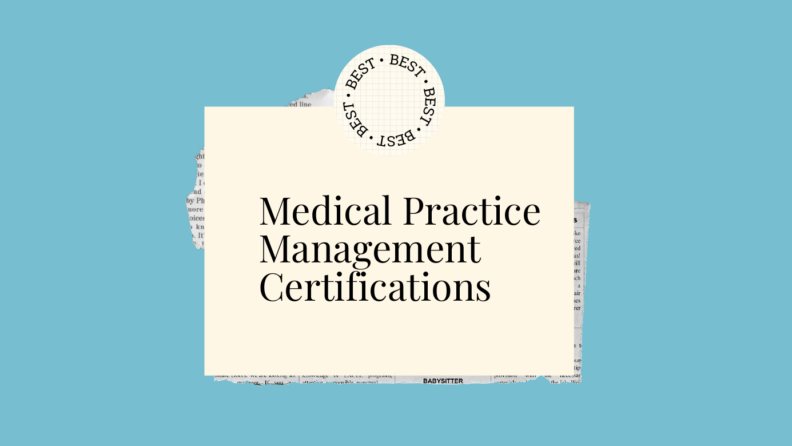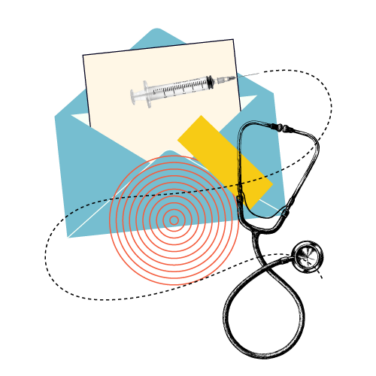Medical practice management certifications help healthcare administrators enhance skills in business operations, ensuring effective management of medical practices.
Certification validates professionals' expertise in billing and compliance, crucial areas for managing a medical practice successfully.
Certified professionals excel in patient care coordination, improving the efficiency and quality of care provided to patients.
These certifications help professionals remain competitive in the ever-evolving healthcare industry by equipping them with current and essential skills.
Achieving certification not only validates your skills but also opens up more career opportunities and potential advancement in the healthcare field.
Medical practice management certifications are essential for healthcare administrators and professionals aiming to enhance their skills in managing the business operations of medical practices. It validates expertise in billing, compliance, and patient care coordination, ensuring professionals stay competitive in the healthcare industry.
I've summarized the best medical practice management certifications with notes about who and what is best for you so you can find the right one for the next step in your career.
Best Medical Practice Management Certifications Shortlist
- Certified Medical Practice Executive (CMPE) - Best for medical practice leadership
- Certified Medical Manager (CMM) - Best for practice administration
- Certified Physician Practice Manager (CPPM) - Best for physician practice management
- Healthcare Financial Management Association Certified Healthcare Financial Professional (CHFP) - Best for financial expertise in healthcare
- Certified Healthcare Access Manager (CHAM) - Best for patient access management
- Certified Professional in Healthcare Information and Management Systems (CPHIMS®) - Best for health IT professionals
- Certified Healthcare Administrative Professional (CHAP) - Best for healthcare administration
- Certified Professional in Healthcare Quality (CPHQ) - Best for healthcare quality improvement
- Healthcare Compliance Certified Professional (HCCP) - Best for healthcare compliance
- Certified Professional in Healthcare Risk Management (CPHRM) - Best for risk management in healthcare
- Fellow of the American College of Healthcare Executives (FACHE) - Best for healthcare executive leadership
- Registered Medical Manager (RMM) - Best for medical office management
- Healthcare Information and Management Systems Society Certified Professional (CAHIMS) - Best for entry-level health IT roles
- Medical Management Institute’s Certified Medical Office Manager (CMOM) - Best for managing medical office operations
- Certified Healthcare Facility Manager (CHFM) - Best for facility management in healthcare
- Certified Outpatient Coder (COC) - Best for outpatient coding expertise
- Health Care Quality & Management (HCQM) - Best for healthcare quality and management
- Certified Professional Coder (CPC) - Best for professional coding skills
Overview of the Best Medical Practice Management Certifications
1. Certified Medical Practice Executive (CMPE) - Best for medical practice leadership

The Certified Medical Practice Executive (CMPE) Certification is a recognized standard in the medical practice management field. It equips professionals with knowledge and skills in managing medical practices and core competencies such as financial management, operational efficiency, patient-centered care, and risk mitigation.
Issued by: American College of Medical Practice Executives (ACMPE)
Focus:
- Medical practice management principles
- Leadership and organizational governance
- Financial management and strategy
- Human resource management
- Information management and technology
Prerequisites:
- Education: Bachelor's Degree or have completed 120 college credit hours
- Work Experience: At least 2 years of healthcare experience
- Exam: Required (2 exams)
- Other Certifications Required: None
Renewability: Yes, it requires maintaining MGMA membership and submitting 50 continuing education hours every three years.
Price:
- Member price: $265
- Non-member price: $611
Who It’s For: Individuals aiming to validate their expertise in medical practice management, enhancing their leadership roles and career progression within the healthcare sector.
2. Certified Medical Manager (CMM) - Best for practice administration
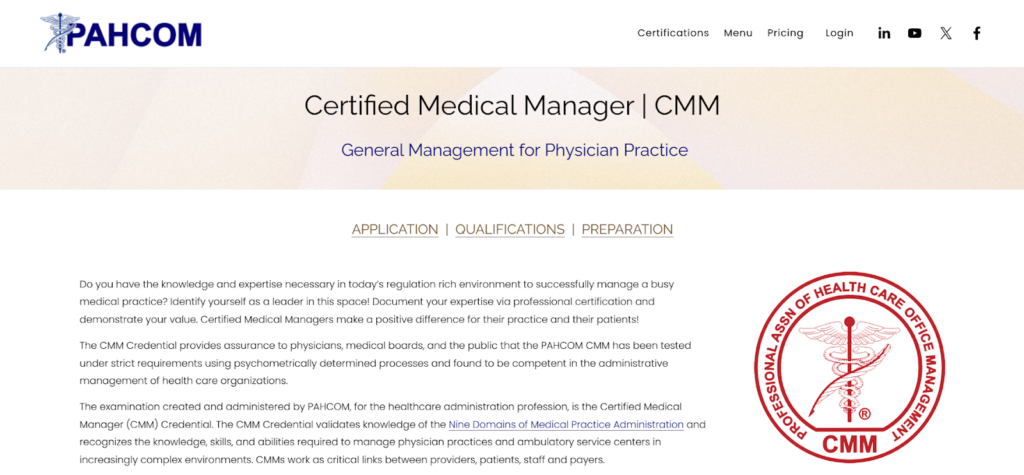
The Certified Medical Manager (CMM) credential helps professionals demonstrate expertise in the Nine Domains of Medical Practice Administration, including financial management, human resources, compliance, technology, and patient relations. This certification emphasizes knowledge, skills, and leadership abilities to effectively manage physician practices and ambulatory service centers.
Issued by: PAHCOM
Focus:
- Healthcare administrative management
- Medical practice operations
- Physician practice management
- Ambulatory service center management
Prerequisites:
- Education: 12 post-secondary education credits related to healthcare or management (college, university, or vocational school)
- Work Experience: 2 years experience in the healthcare industry in support of patient care
- Exam: Required
- Other Certifications Required: None
Renewability: Yes, it requires submitting continuous education units and continuous membership to PAHCOM or retesting annually.
Price:
- Standard Exam: $770
- Physician Admin Members: $385
Who It’s For: Individuals aiming to demonstrate their competency in managing medical practices and serve as a critical link between providers, patients, staff, and payers.
3. Certified Physician Practice Manager (CPPM) - Best for physician practice management
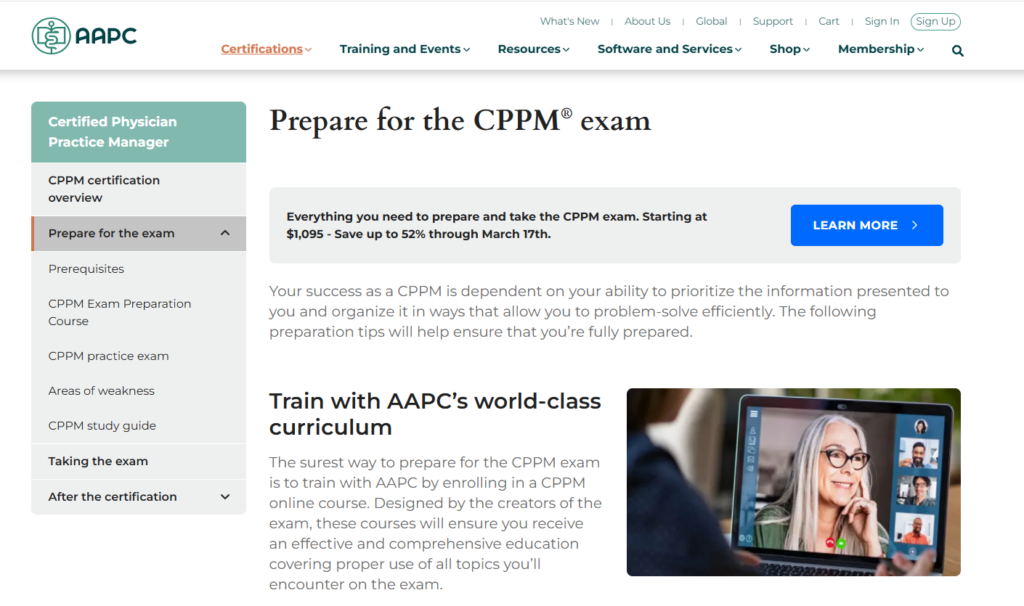
The Certified Physician Practice Manager (CPPM) certification ensures proficiency in various critical responsibilities, including revenue cycle management, compliance with healthcare regulations, human resources, health information management, and general business operations. It enhances a professional’s ability to oversee multiple processes while adapting to the healthcare industry’s challenges.
Issued by: AAPC
Focus:
- Healthcare Business Operations
- Financial Management
- Human Resource Management
- Compliance and Risk Management
- Revenue Cycle Management
Prerequisites:
- Education: A high-level understanding of the various types of insurance plans, fraud, abuse, and corporate compliance, human resource management, HIPAA and data security, health information technology, among others.
- Work Experience: Physician practice management experience
- Exam: Required
- Other Certifications Required: None
Renewability: Yes, it requires maintaining AAPC annual membership, and earning 36 continuing education units every two years.
Price:
- One-exam attempt: $399
- Two-exam attempts: $499
- Exam prep training: $1,195
Who It’s For: Ideal for professionals aiming to demonstrate their capability in managing a physician's practice, highlighting their expertise in efficiently handling administrative and operational responsibilities.
4. Healthcare Financial Management Association Certified Healthcare Financial Professional (CHFP) - Best for financial expertise in healthcare
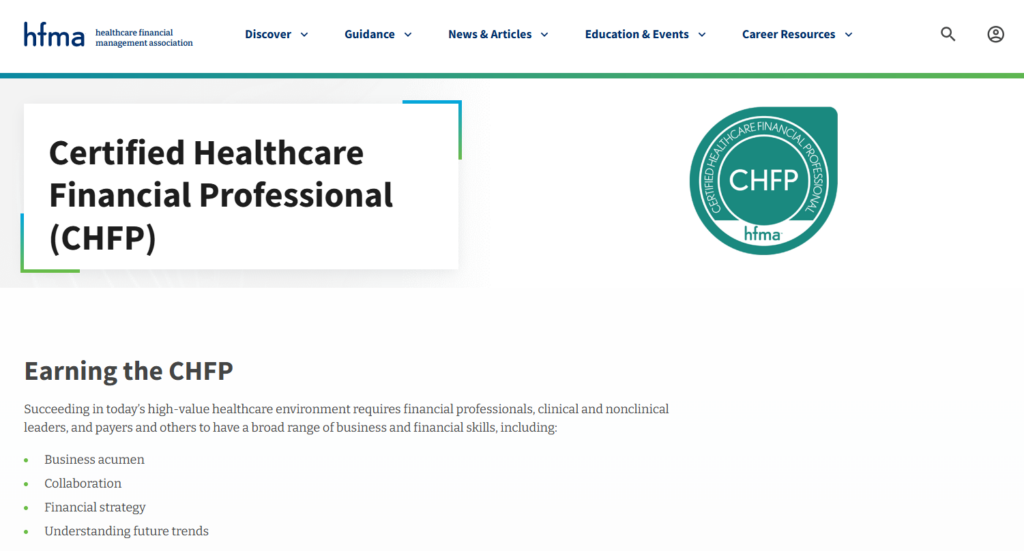
The Certified Healthcare Financial Professional credential helps navigate the financial complexities of the healthcare industry. It provides mastery across four essential pillars: business acumen, collaboration, financial strategy, and understanding future trends.
Issued by: Healthcare Financial Management Association (HFMA)
Focus:
- Business acumen
- Collaboration
- Financial strategy
- Understanding future trends in healthcare finance
Prerequisites:
- Education: Completion of these modules:
- CHFP Module I – HFMA Business of Health Care ®
- Module II – Operational Excellence Assessment
- Work Experience: Not required
- Exam: Required
- Other Certifications Required: None
Renewability: Yes, it requires active HFMA membership and must complete 60 contact hours in eligible education programs/activities every three years.
Price: Modules are included with HFMA all-access membership:
- Business Partner: $515
- Professional: $475
- Faculty: $205
- Student: $50
- Organizations: Pricing upon request
Who It’s For: Individuals aiming to demonstrate comprehensive knowledge in healthcare finance and excel in the financial aspects of the healthcare industry.
5. Certified Healthcare Access Manager (CHAM) - Best for patient access management
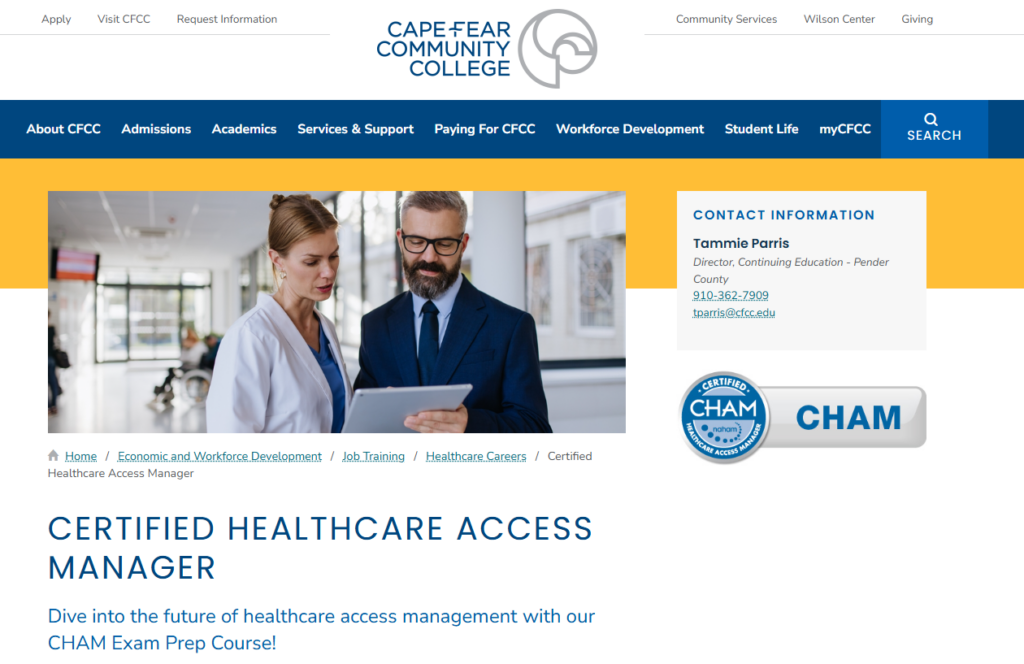
The Certified Healthcare Access Manager certification demonstrates excellence in admissions, registrations, patient finance, and guest relations. It covers the skills for effectively managing patient access operations, ensuring good patient experience, and compliance with healthcare regulations.
Issued by: Cape Fear Community College (CFCC)
Focus:
- Healthcare access management
- Patient access services
- Leadership in healthcare environments
Prerequisites:
- Education: At least a high school diploma or GED equivalent and 90 professional development contact hours earned in the last three years or a four-year degree from an accredited institution in healthcare, business, or related field
- Work Experience: At least 2 years of management experience in healthcare/finance
- Exam: Required
- Other Certifications Required: None
Renewability: No, it does not expire.
Price: $345
Who It’s For: Individuals aiming to demonstrate expertise and commitment to managing patient access service in healthcare settings
6. Certified Professional in Healthcare Information and Management Systems (CPHIMS®) - Best for health IT professionals
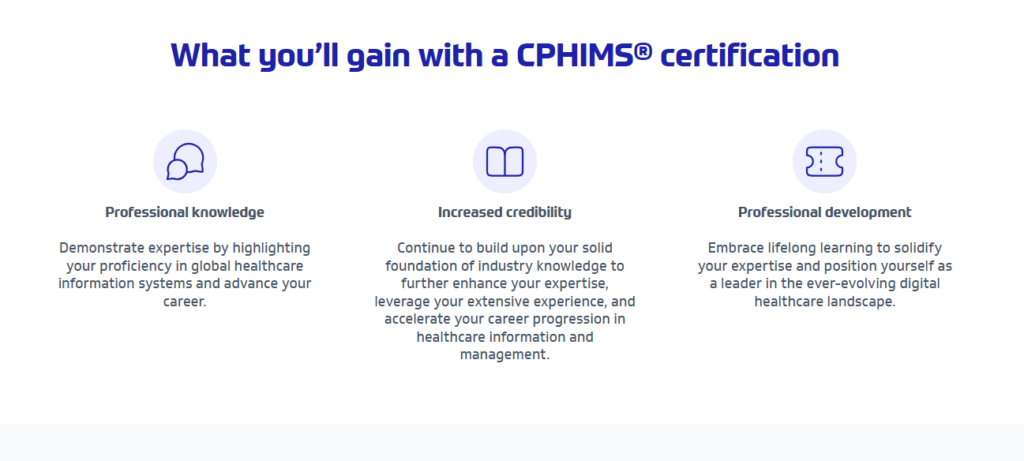
The Certified Professional in Healthcare Information and Management Systems credential demonstrates advanced proficiency in healthcare information systems. It positions learners as experts in leveraging technology to improve patient care operational efficiency and enhances understanding in planning, designing, implementing, and maintaining health IT solutions.
Issued by: HIMSS
Focus:
- Global healthcare information systems
- Healthcare IT expertise
- Professional knowledge and credibility in digital healthcare
Prerequisites:
- Education: At least a bachelor's degree from an accredited college or university
- Work Experience: At least 3 years of information and management systems, with two of those years in a healthcare setting
- Exam: Required
- Other Certifications Required: None
Renewability: Yes, it requires reexamination or obtaining 45 continuing education credits every three years.
Price:
- HIMSS Organizational Affiliate Member: $499
- HIMSS Member, Corporate Member, or Student Member: $549
- Non-member: $659
Who It’s For: Professionals in healthcare IT aiming to demonstrate a high level of expertise and commitment in the field.
7. Certified Healthcare Administrative Professional (CHAP) - Best for healthcare administration
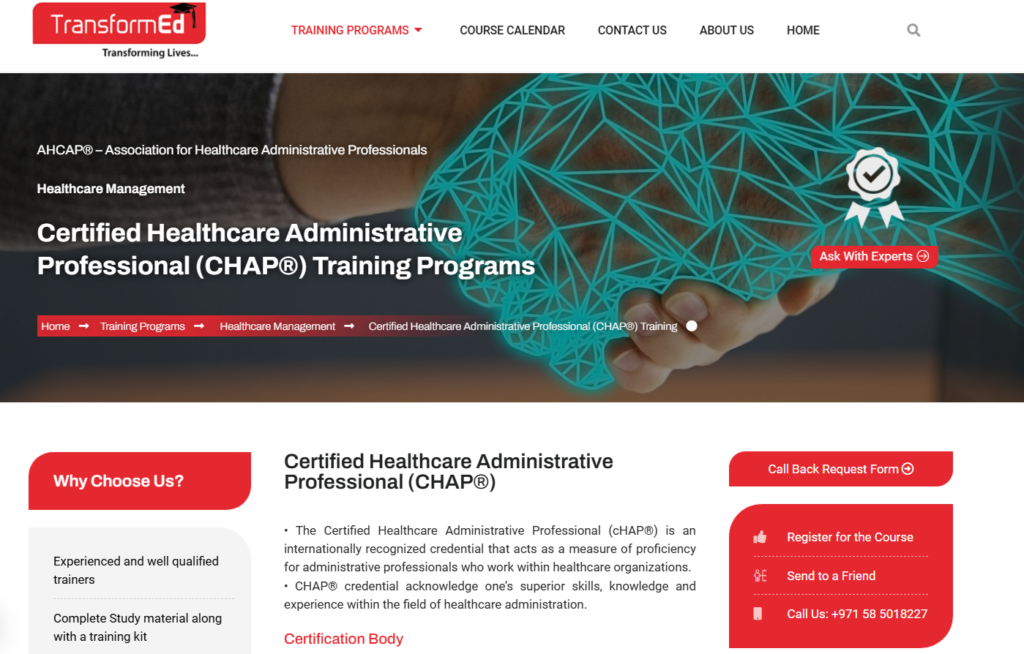
The Healthcare Administrative Professional (HAP) certification emphasizes the role of administrative professionals in healthcare leadership and management. It allows professionals to demonstrate their abilities in managing healthcare operations, supporting clinical and non-clinical staff, regulatory compliance, patient communication, and the importance of innovation to healthcare organizations.
Issued by: Association for Healthcare Administrative Professionals (AHCAP)
Focus:
- Healthcare administration
- Administrative proficiency in healthcare settings
Prerequisites:
- Education: Associate's degree or higher from an accredited college or university
- Work Experience: At least 7 years of administrative experience in healthcare
- Exam: Required
- Other Certifications Required: None
Renewability: Yes, it requires 30 continuing education units every three years.
Who It’s For: Designed for healthcare administrators, medical managers, quality management professionals, and risk managers, to advance their careers within the healthcare administration field.
8. Certified Professional in Healthcare Quality (CPHQ) - Best for healthcare quality improvement
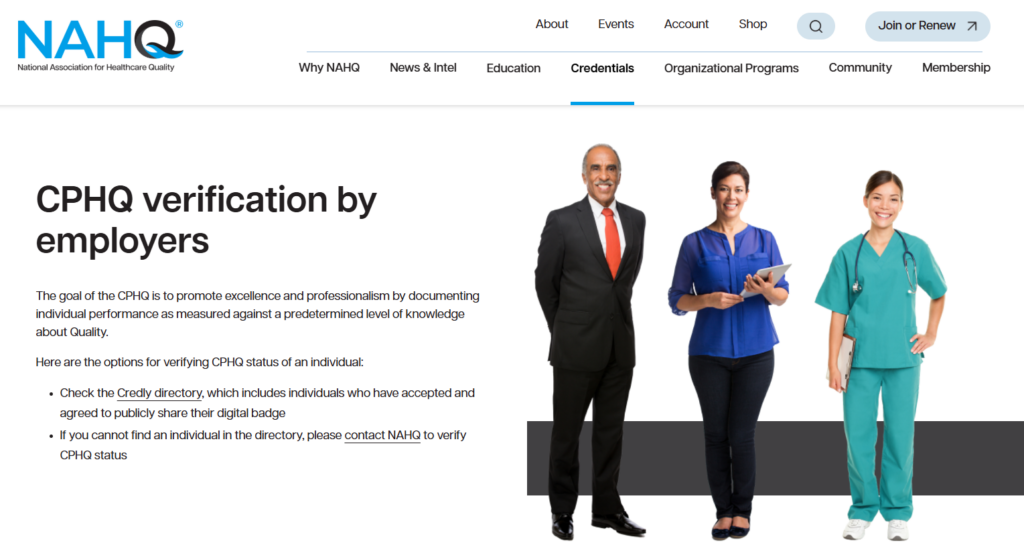
The Certified Professional in Healthcare Quality (CPHQ) credential demonstrates an understanding of quality principles and practices for enhancing patient care and organizational performance. The certification encompasses health data analytics, patient safety, performance and process improvement, regulatory and accreditation, quality review, and accountability.
Issued by: National Association for Healthcare Quality (NAHQ)
Focus:
- Healthcare quality improvement
- Safety
- Compliance
- Performance management
Prerequisites:
- Education: Not required
- Work Experience: At least 2 years of experience in healthcare is ideal
- Exam: Required
- Other Certifications Required: None
- Renewability: Yes, it requires obtaining and maintaining documentation of 30 continuous education units in 2 years.
Who It’s For: Healthcare professionals seeking to demonstrate expertise in healthcare quality and patient safety, including those in quality management, performance improvement, risk management, and patient care roles.
9. Healthcare Compliance Certified Professional (HCCP) - Best for healthcare compliance
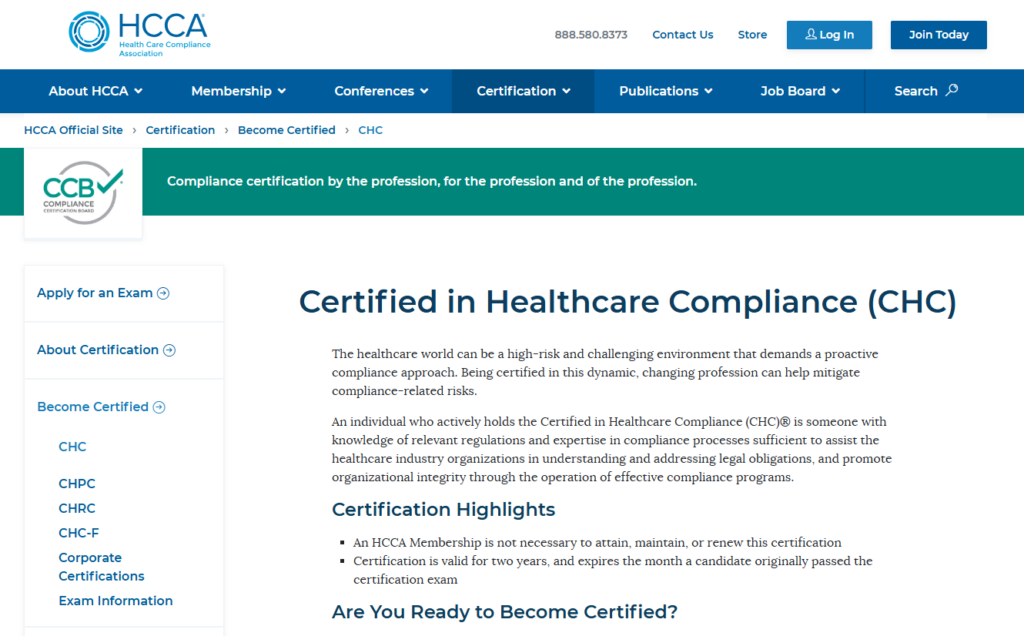
The Healthcare Compliance Certified Professional (HCCP) credential signifies a comprehensive understanding of healthcare laws, regulations, and ethical standards. The certification covers policies and procedures, compliance program administration, auditing and internal reporting systems, and investigations and remedial measures for corrective actions.
Issued by: Health Care Compliance Association (HCCA)
Focus:
- Understanding healthcare laws and regulations
- Implementing compliance programs
- Managing compliance risks
- Promoting organizational integrity
Prerequisites:
- Education: Completed a certificate program from a CCB-accredited university within the last two years
- Work Experience: At least 1-year experience or 1,500 hours of direct compliance job duties
- Exam: Required
- Other Certifications Required: None
Renewability: Yes, it requires earning and submitting 40 CCB continuing education units within two years.
Price:
- SCCE or HCCA member: $350
- Non-member: $450
Who It’s For: Healthcare professionals responsible for ensuring regulatory compliance, ethical practices, and legal risk management within their organizations.
10. Certified Professional in Healthcare Risk Management (CPHRM) - Best for risk management in healthcare
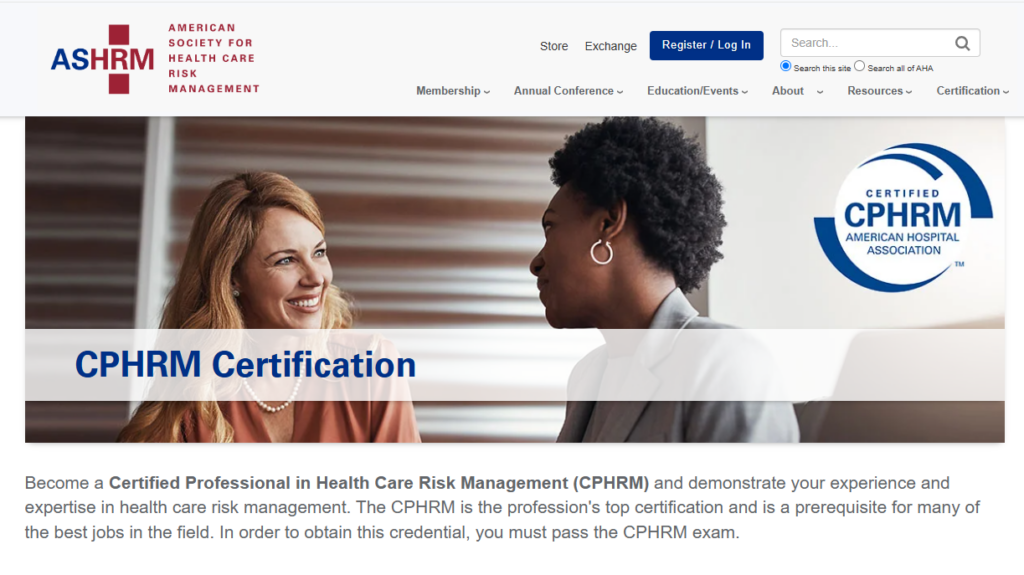
The Certified Professional in Health Care Risk Management (CPHRM) credential reflects expertise in clinical and patient safety, risk financing, legal and regulatory compliance, healthcare operations, and claims and litigation management. The certification ensures that professionals are equipped to identify, assess, and mitigate risk to enhance patient safety and organizational resilience.
Issued by: American Hospital Association Certification Center
Focus:
- Clinical/Patient Safety
- Risk Financing
- Legal and Regulatory
- Health Care Operations
- Claims and Litigations
Prerequisites:
- Education and Work Experience: Meet at least one of the following:
- Baccalaureate degree or higher from an accredited college or university with 5 years of experience in a healthcare
- Associate degree or equivalent from an accredited college with 7 years of experience in a healthcare
- High school diploma or equivalent with 9 years of experience in a healthcare
- Exam: Required
- Other Certifications Required: None
Renewability: Yes, it requires reexamination of the CPHRM Certification or completing 45 contact hours of eligible continuing professional education within 3 years.
Price:
- ASHRM members: $275
- Non-members: $425
Who It’s For: Professionals who want to validate their expertise in minimizing risks and enhancing patient safety within healthcare environments.
11. Fellow of the American College of Healthcare Executives (FACHE) - Best for healthcare executive leadership
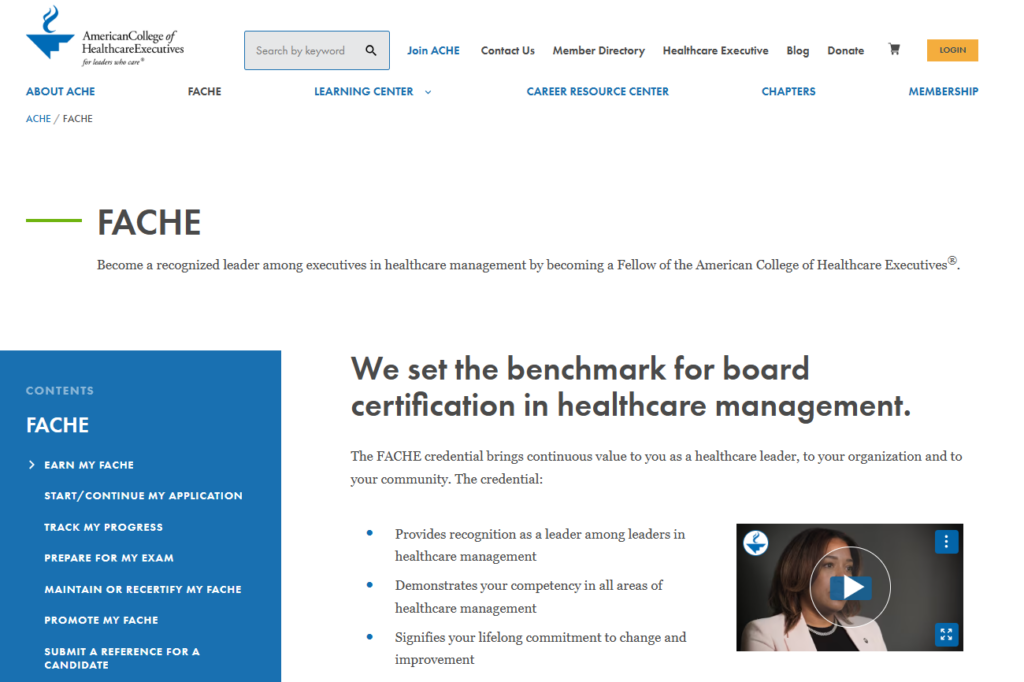
The Fellow of the American College of Healthcare Executives (FACHE) credential is a high standard of achievement in healthcare management, demonstrating knowledge and skills in governance and organizational structure, healthcare technology, information and financial management, laws and regulations, and business and clinical operations. It validates a leader’s proficiency and commitment to healthcare management.
Issued by: American College of Healthcare Executives
Focus:
- Leadership in healthcare management
- Competency in healthcare administration
- Commitment to continuous professional development
Prerequisites:
- Education:
- A Master’s or other post-baccalaureate degree
- At least 36 continuing education credits related to healthcare management
- Work Experience: Currently holding an executive-level healthcare management position and has at least 5 years of healthcare management experience
- Exam: Required
- Other Certifications Required: None
- Others:
- Membership with ACHE for at least one year
- Interview with a current Fellow
- Reference with a current Fellow or senior organization leader
- 4 volunteer activities
Renewability: Yes, it requires reexamination or earning 36 continuing education units and completing 4 volunteer activities.
Price: $250
Who It’s For: Experienced healthcare executives seeking to validate their leadership, management expertise, and commitment to excellence in healthcare administration.
12. Registered Medical Manager (RMM) - Best for medical office management
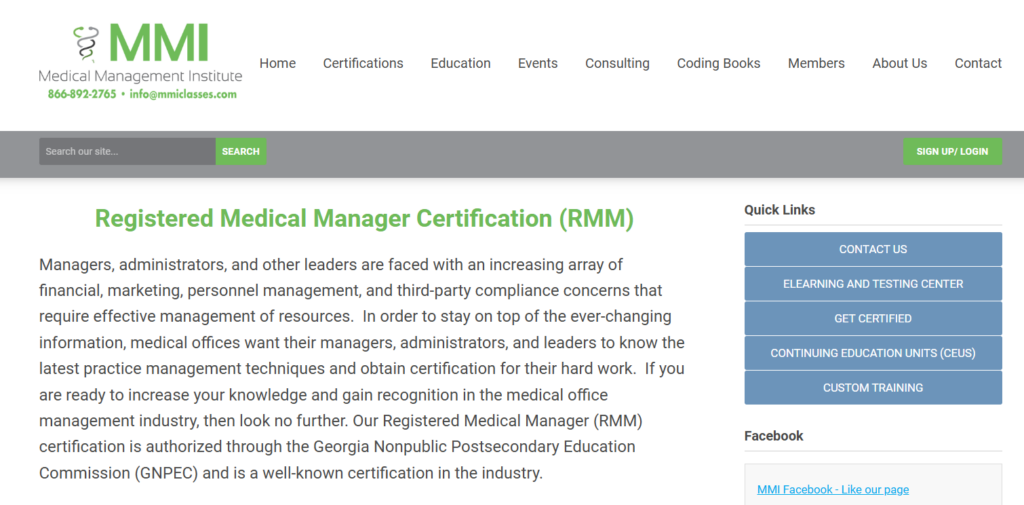
The Registered Medical Manager certification addresses the various responsibilities of medical office management, including financial oversight, marketing strategies, personnel management, and compliance with third-party regulations. It demonstrates a professional’s proficiency in practice management techniques, including strategic planning, marketing in medicine, and regulatory compliance.
Issued by: Medical Management Institute
Focus:
- Strategic Planning
- Marketing
- Leadership
- Financial Controls
- Regulatory Compliance (including HIPAA)
Prerequisites:
- Education: At least 10 hours of training related to Anatomy & Terminology is recommended
- Work Experience: Medical coding and/or billing experience
- Exam: Required
- Other Certifications Required: None
Renewability: Yes, it requires submitting 12 continuing education units for 1 certification.
Price: $1,499
Who It’s For: Healthcare professionals aiming to enhance their expertise in managing medical practices, including financial operations, compliance, and team leadership.
13. Healthcare Information and Management Systems Society Certified Professional (CAHIMS) - Best for entry-level health IT roles
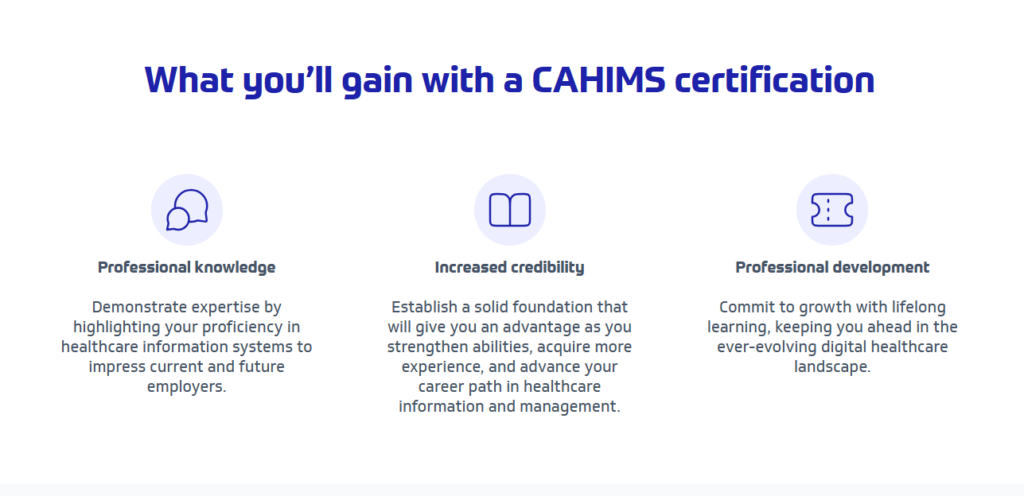
The Certified Associate in Healthcare Information and Management Systems (CAHIMS) credential is a foundational certification demonstrating proficiency in healthcare information systems. It covers understanding the roles and technologies of different healthcare organizations, clinical vocabulary, metrics, and application of informatics. Additionally, it equips learners with skills in system analysis, design, evaluation, and management of healthcare information systems.
Issued by: HIMSS
Focus:
- Healthcare IT foundations
- Information management systems
- Technological infrastructure in healthcare
Prerequisites:
- Education and Work Experience: Meet at least one of the following:
- High School Diploma or equivalent with at least 45 hours of continuing education in healthcare information technology, digital health, or informatics or 150 hours of IT and healthcare experience
- Associate, Bachelor’s, or advanced degree from an accredited college or university with at least 25 hours of continuing education in healthcare information technology, digital health or informatics or 75 hours of IT and healthcare experience
- Exam: Required
- Other Certifications Required: None
Renewability: Yes, it requires reexamination or obtaining 45 continuing education credits every three years.
Price:
- HIMSS Organizational Affiliate Member: $329
- HIMSS Member, Corporate Member, or Student Member: $379
- Non-member: $419
Who It’s For: Individuals looking to establish a foundational understanding of healthcare IT systems, enabling them to pursue entry-level roles in the field.
14. Medical Management Institute’s Certified Medical Office Manager (CMOM) - Best for managing medical office operations
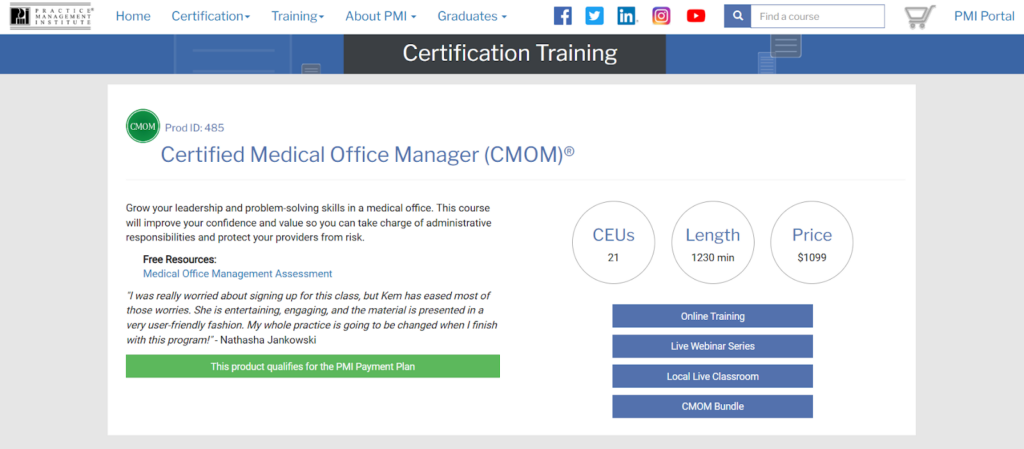
The Certified Medical Office Manager (CMOM) credential enhances medical office managers’ leadership and problem-solving skills. The certification aims to improve communication with providers, third-party payers, patients, and business associates, and covers five key areas: practice management, personnel management, financial management, compliance requirements, and managed care delivery system.
Issued by: Practice Management Institute (PMI)
Focus:
- Business operations
- Financial management
- Human resources
- Compliance
- Risk management
Prerequisites:
- Work Experience: At least one year of experience in a medical practice
- Exam: Required
- Other Certifications Required: None
Renewability: Yes, it requires 12 continuing education units earned one year prior to the certification expiration date.
Price: $1,099
Who It’s For: Medical office managers aiming to enhance their ability to manage office operations, improve financial performance, and navigate complex healthcare management issues efficiently.
15. Certified Healthcare Facility Manager (CHFM) - Best for facility management in healthcare
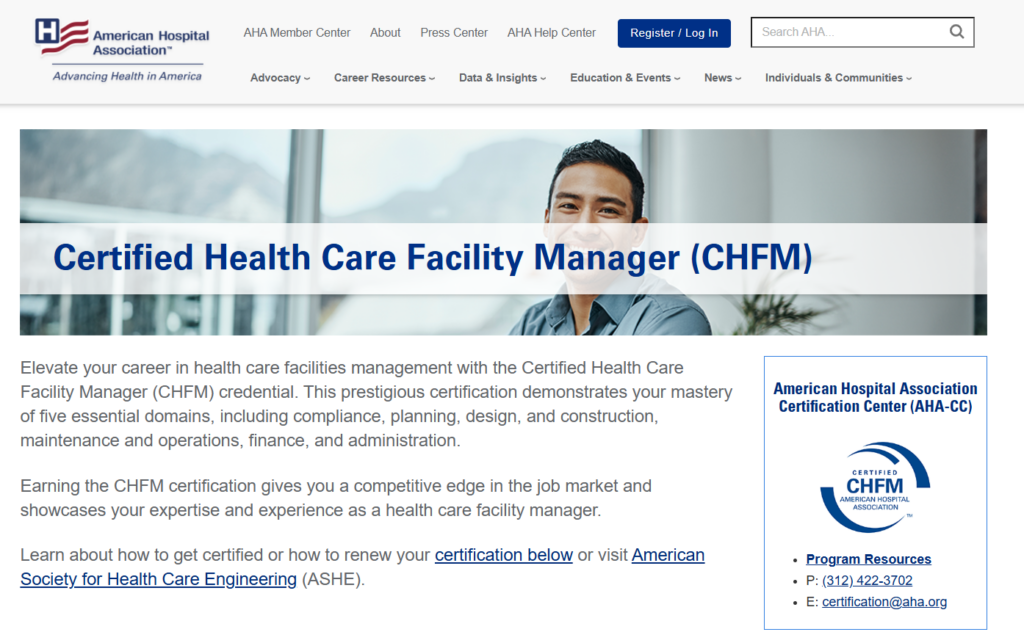
The Certified Healthcare Facility Manager (CHFM) is an industry-recognized certification that validates a professional’s expertise in maintaining safe, efficient, and compliant healthcare environments. It covers adherence to healthcare regulations, overseeing the development, renovation and functionality of facilities, and budgets and cost control.
Issued by: American Hospital Association
Focus:
- Compliance
- Planning, design, and construction
- Maintenance and operations
- Finance and administration
Prerequisites:
- Education and Work Experience: Meet at least one of the following:
- Baccalaureate degree from an accredited college or university with 3 years of associated engineering experience
- Associate degree from an accredited college or university with 5 years of associated engineering experience
- High school diploma or equivalent with 7 years of associated engineering experience
- Exam: Required
- Other Certifications Required: None
Renewability: Yes, it requires reexamination or earning 45 continuing education credits.
Price:
- ASHE Members: $275
- Non-members: $425
Who It’s For: Professionals responsible for managing, maintaining, and ensuring compliance within healthcare facilities.
16. Certified Outpatient Coder (COC) - Best for outpatient coding expertise
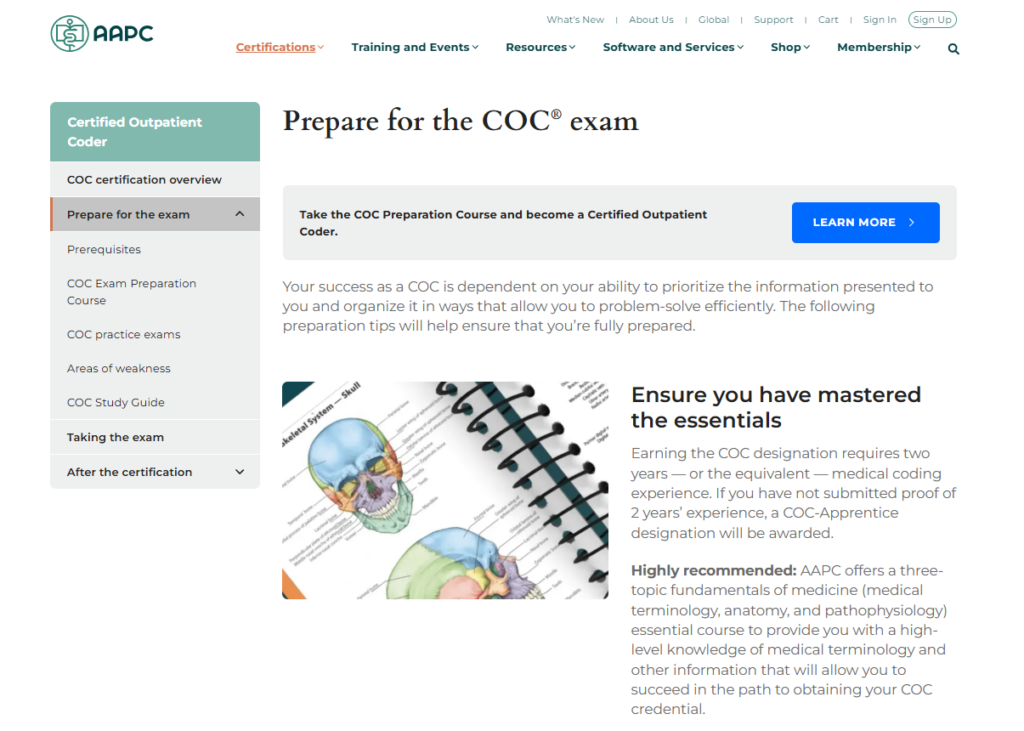
The Certified Outpatient Coder (COC) credential shows proficiency in assigning accurate medical codes for diagnoses, procedures, and services, ensuring appropriate reimbursement and compliance with healthcare regulations. It covers and demonstrates expertise in medical terminology and anatomy, coding guidelines and regulations, and outpatient coding concepts.
Issued by: AAPC
Focus:
- Ambulatory Payment Classifications (APCs)
- Medicare Severity-Diagnosis-Related Groups (MS-DRGs)
- Outpatient coding guidelines
- CPT®, HCPCS Level II, ICD-10-CM coding systems
Prerequisites:
- Education: A high-level knowledge of medical terminology, anatomy, and pathophysiology, and an understanding of the proper application of CPT® procedure codes
- Exam: Required
- Other Certifications Required: None
Renewability: Yes, it requires maintaining AAPC annual membership and earning 40 continuing education units every 2 years.
Price:
- One-exam attempt: $399
- Two-exam attempt: $499
- Exam prep training: $2,195
Who It’s For: Professionals specializing in coding outpatient hospital and ambulatory surgical center services, ensuring accurate reimbursement and compliance.
17. Health Care Quality & Management (HCQM) Certification - Best for healthcare quality and management
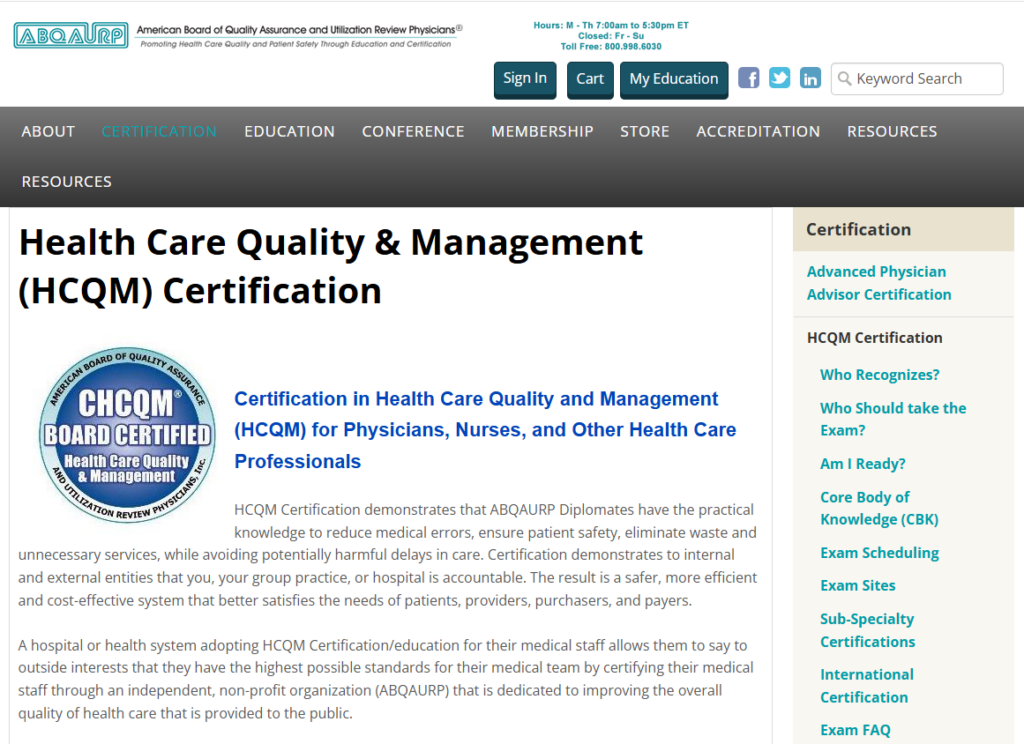
The Health Care Quality and Management Certification signifies practical knowledge in reducing medical errors, ensuring patient safety, eliminating unnecessary services, and preventing delays in care. It encompasses key topics, including models for patient care across different settings, processes for medical staff qualifications and competencies, systems such as HMOs, PPOs, Medicare, and Medicaid, and technology and data systems to improve healthcare delivery.
Issued by: ABQAURP
Focus:
- Reducing medical errors
- Ensuring patient safety
- Eliminating healthcare delivery waste
- Improving efficiency in healthcare
Prerequisites:
- Work Experience:
- Current, non-restricted license in each state or territory of the United States
- Documentation of active involvement in Health Care Quality within the past five years, a minimum of 208 hours
- Completed at least 25 hours of ABQAURP-approved continuing medical education
- Exam: Required
- Other Certifications Required: None
Renewability: Yes, it requires at least 8 CME/CE credit hours of continuing education related to Health Care Quality and Management every 2 years, or attendance and completion of any ABQAURP-accredited CE conference and online course.
Price:
- Professional Member: $695
- Non-Member: $795
Who It’s For: Healthcare professionals dedicated to improving patient safety, healthcare quality, and efficiency in care delivery.
18. Certified Professional Coder (CPC) - Best for professional coding skills
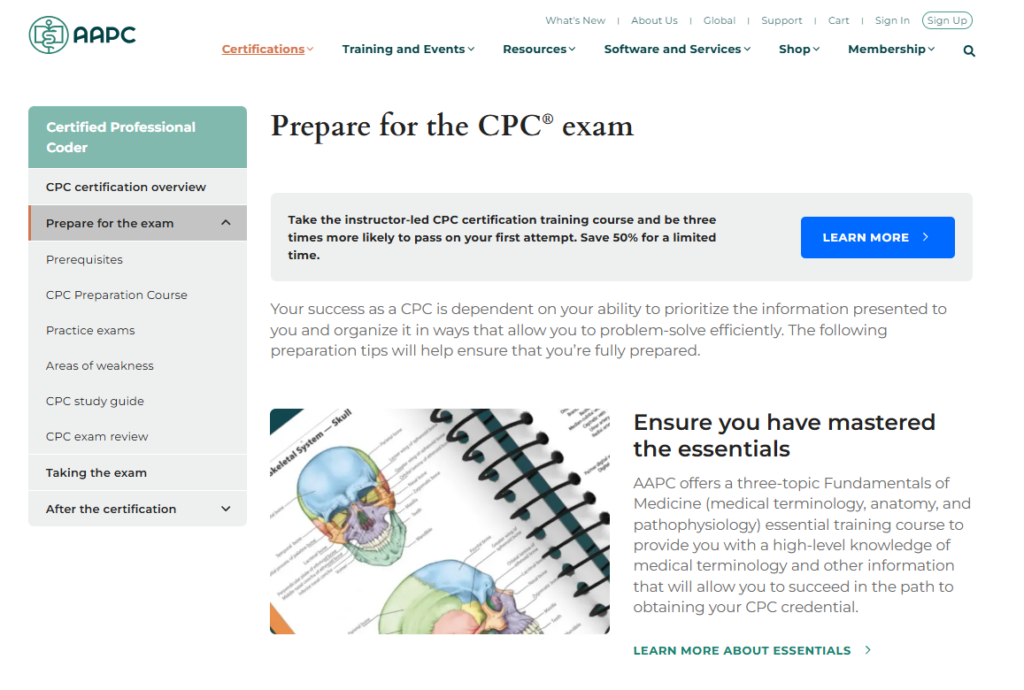
The Certified Professional Coder (CPC) evaluates the ability to code services by physicians and non-physician providers, ensuring adherence to coding standards and regulatory compliance. The certification assesses knowledge of medical language and human anatomy for interpreting clinical documentation, official coding guidelines, regulatory requirements for compliance, coding systems for different medical services and diagnoses, and codes for surgical interventions.
Issued by: AAPC
Focus:
- Proficiency in CPT®, HCPCS Level II, and ICD-10-CM coding
- Documentation review
- Regulatory compliance
Prerequisites:
- Education: A high-level knowledge of medical terminology, anatomy, and pathophysiology
- Exam: Required
- Other Certifications Required: None
Renewability: Yes, it requires maintaining an AAPC membership and earning 36 continuing education units every 2 years.
Price:
- One-exam attempt: $399
- Two-exam attempt: $499
- Exam prep training: $2,699
Who It’s For: Medical coding professionals specializing in physician office coding and seeking to ensure accurate billing and regulatory compliance.
FAQs about Medical Practice Management Certification
What are medical practice management certifications?
Medical practice management certification is a professional credential demonstrating expertise in managing and administrating medical practices. It is pursued by healthcare administrators, managers, and those looking to advance in their careers by showcasing their knowledge and skills in medical practice operations.
What are the main requirements for obtaining a medical practice management certification?
To achieve certification, candidates must pass multiple-choice and scenario-based exams after meeting education and experience prerequisites. The certification program typically covers six domains including operations management, financial management, and human resource management among others.
How long does it take to become certified in medical practice management?
The time it takes to become certified in medical practice management depends on the specific certification program and the candidate's background. For instance, preparing for and passing the CMPE exam may take several months, considering the need to study relevant materials and possibly complete required coursework.
What are the benefits of obtaining medical practice management certification?
Obtaining medical practice management certification can provide numerous benefits, including increased job opportunities, enhanced professional credibility, and the potential for higher salaries. It demonstrates a commitment to the field and a comprehensive understanding of medical practice management principles.
Do certified individuals earn more than non-certified individuals?
While certifications do not guarantee increased earnings, certified MGMA members have reported higher compensation, with differences of $13,690 for executive management and $9,627 for general management positions compared to non-certified individuals.
Other Useful Resources
Here are a few other useful resources to check out:
What’s Next?
To stay updated on the latest trends, best practices, and solutions related to your medical practice, subscribe to The Medical Practice newsletter.


